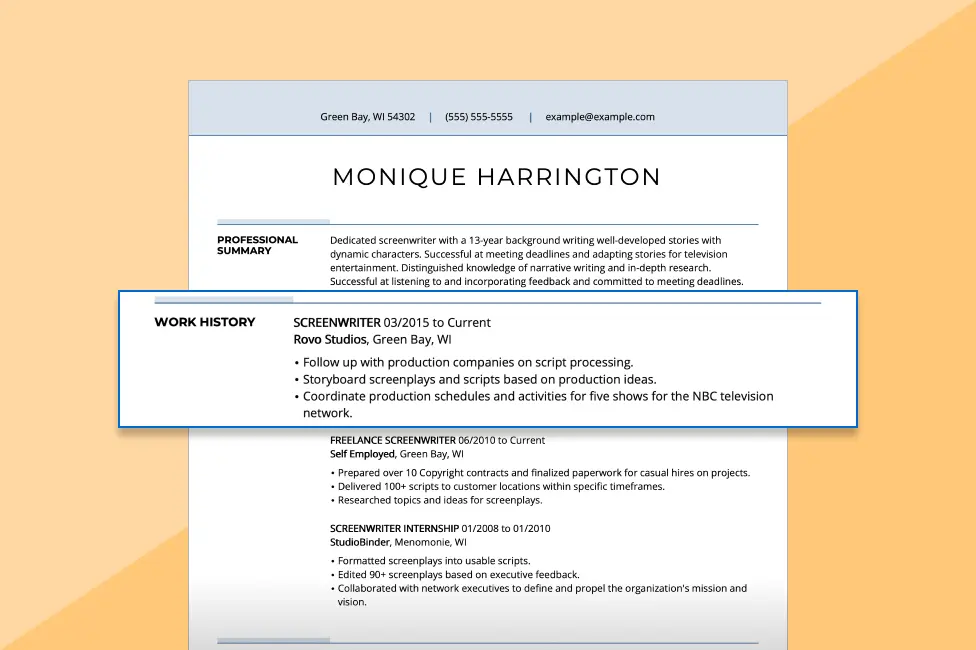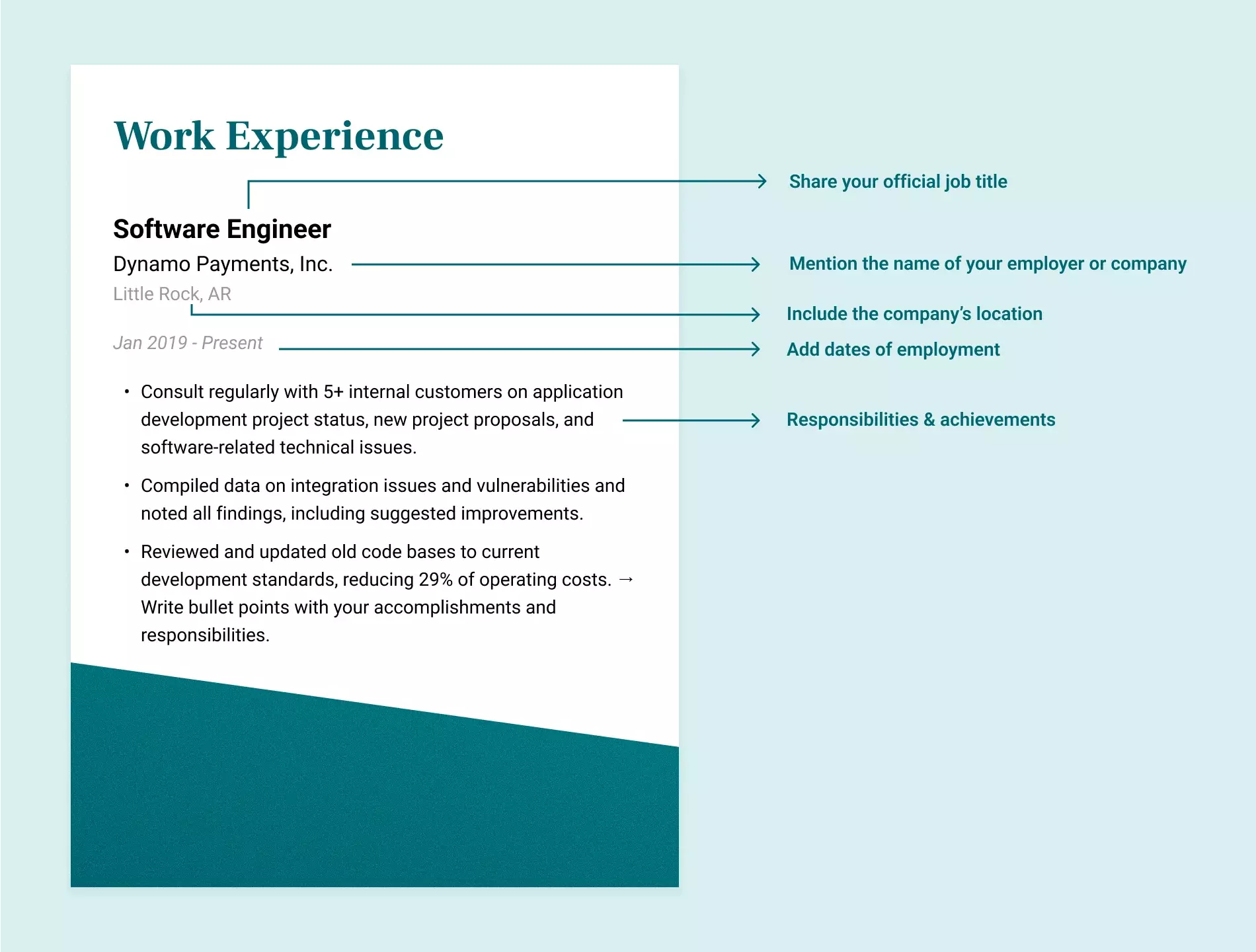How to Write a Resume Work Experience Section
Work experience is one of the most crucial resume sections. It shows recruiters you have the skills and experience to do the job. We’ll teach you to write a work experience section that wins interviews.
Hired By:*


What is a work experience section, and why is it important?
Your resume’s work experience section shows employers the jobs you’ve held in the past, the type of work you performed in each role and your career progress. It’s a detailed overview of the career accomplishments that best demonstrate you have the skills and knowledge necessary to excel at a particular job.
Listing work experience is important as it gives hiring managers a clear idea of your strengths by showing off your career accomplishments and impact at past companies. Hence, tailoring or editing your work experience for every job application is crucial to landing a job interview!
How to write your resume
work experience
This example shows you all the information recruiters need in your work experience section. Below, we’ll explain how to write each element of your resume’s work experience.
Resume work experience sample
Work Experience
Customer service representative 11/2022 – Present
Advanced Call Center Technologies, LLC | Reno, NV
- Reduced customer resolution time by 15% through effective issue identification and prompt resolution strategies.
- Increased customer satisfaction scores by 20% by providing comprehensive product knowledge, technical support, and tailored solutions to customer inquiries.
- Maintained 95% customer satisfaction rating, surpassing company expectations by 5%.
Call center operator 01/2022 – 11/2022
Mass Mutual Insurance | Reno, NV
- Reduced average call handling time by 12% through efficient prioritization and resolution of customer inquiries.
- De-escalated tense calls, demonstrating exceptional conflict resolution and problem-solving skills.
- Handled a high volume of inbound calls efficiently, maintaining an average call handling time of under two minutes.
1Include your job title or position.
Your resume work experience will include the jobs you’ve held in the past 10 years. These job titles should appear in reverse-chronological order, meaning you put your current or latest job first and work backward. State your official title since this gives the employer a clear idea of your responsibilities.
You might have seen the trend of changing your job title to make it seem unique or creative. This approach rarely works since it can throw off recruiters expecting to see traditional job titles and raise flags in applicant tracking systems (ATS) programmed to search for specific keywords. In conclusion, stick to the job titles the employer gave you.
2Mention the company name and location.
For each job title you list, you must mention the company or employer’s name and location (city and state).
This information allows recruiters to research your previous roles and verify your data, so be honest.
3List your employment dates.
Always list your employment duration dates so recruiters can understand how many years of experience you have.
You don’t have to worry about remembering the exact date; the month and year will be enough.
4Add your achievements.
Last, you should include at least three bullet points describing your most relevant achievements under each job. Showcase accomplishments you’re particularly proud of. Remember to differentiate between generic responsibilities and actual achievements. Basic job duties will be virtually the same for every applicant with the same profession, but your achievements are unique to you.
Here’s an example of how to list achievements on a resume:
“Supervised 15 new hires and trained them in upselling techniques, which resulted in 23% increase of credit card applications at check out.”
Notice how this work experience description begins with an action verb. This one word already denotes this applicant worked in a supervisory role. That’s a valuable piece of information. Then, it mentions skills like training and upselling and concludes with a quantifiable achievement illustrating the impact of their efforts.
Stick to this formula: Action verb + key skills + quantifiable achievement = an excellent work history section.
PRO TIP
Be consistent with tense when writing your work history descriptions. Write in the present tense when describing achievements in your current job, but use the past tense for all previous jobs. Doing so orients the reader in time and shows you have an eye for detail.
The resume work experience section will take up most of your time when writing a resume. However, you can write a professional resume fast with the help of our Resume Builder. Just type in your desired job title, and the Builder will generate personalized recommendations you can copy and paste onto your resume.
What counts as work experience?
There are less traditional experiences you can showcase in your work experience that can still impress recruiters. After all, what matters most is showcasing your strengths and qualifications for the role.
The following are acceptable additions to your resume’s work experience section:
- Internships
- Seasonal jobs
- Helping out at a family member’s business
Independent of the degree of formality of your work experiences, they can provide valuable skills and qualifications if you approach them correctly.
The most important thing to remember is never to lie or exaggerate the truth; it will come out eventually. You’ll also want to focus on achievements that best demonstrate you possess the skills and qualifications a specific role requires.
How to address gaps in your work experience
Life happens: you hit a rough patch, a family member gets sick, you want to focus on parenting or you go back to school. These are just a handful of valid reasons someone may have gaps in their work experience, and a good employer will understand this.
In fact, CNBC interviewed workplace experts who state that owning up to a career break can be your chance to flip the script to focus on the positive, such as new skills and renewed energy for work.
What’s crucial is being honest about the years you spent in a role and not “inventing” a job to make up for work gaps. Instead, you can provide a note in your resume stating: “From mm/yyyy to mm/yyyy, I was out of the workforce for personal reasons.”
PRO TIP
Use your cover letter to explain briefly why you were out of the workforce. Although explaining gaps in your work experience isn’t mandatory, showing the skills and knowledge you gained is valuable.
How work experience sections vary by resume format
The length and detail of your work experience will vary based on your chosen resume format. There are three basic resume formats, each of which works for a different type of job seeker. Below, we explore the work experience section’s role in each resume format.
Functional
The functional resume is entirely skills-based, making it perfect for those who are just entering the workforce, have long work history gaps, or want to highlight skills and downplay their work experience for other reasons.
Combination
A combination resume will put your skills section at the top, followed by a detailed work history section, making this format a good choice for many job seekers, particularly mid-level professionals and career changers.
Chronological
A chronological resume is perfect for applicants who aim to showcase a long work history, an impressive career trajectory or significant professional achievements. You should have at least 10 years of experience if using this format.
How to make your work
experience stand out
1Tailor your work experience to a specific job.
The best thing you can do to ensure your work experience compels recruiters to consider you for an interview is to tailor it to the job’s requirements.
An easy way to achieve this is by pinpointing resume keywords and buzzwords in the job description. These resume buzzwords are the skills, experiences, or any professional qualifications employers specifically mention in the job ad. Write down a list of these keywords and skills and weave them naturally into your work history.
Adding relevant buzzwords shows recruiters exactly what they’re looking for and helps your resume pass ATS scans.
2Make regular job duties sound like accomplishments.
How you write about a task is critical. Changing a simple entry, like “Responsible for organizing the supply closet,” to “Spearheaded a major reorganization of office supply closets to simplify the monthly inventory process,” makes a big difference. The second version uses an action verb and helps hiring managers see the work task you completed, your leadership role, and the results your work generated.
3Add metrics and numbers to show your impact.
Numbers are eye-catching and show a recruiter the positive impact of your work. Go back to the list of job duties and accomplishments you have listed and think about them in terms of numbers. Here are some ideas for using resume metrics:
- How many customer emails did you respond to daily?
- What percentage did sales increase during your tenure?
- How many followers did your company gain thanks to your social media skills?
- Where were you able to save the company money?
- How many cars did you repair each month?
Adding these metrics is a much more effective way to get a hiring manager’s attention than just a description of general duties because it quantifies your accomplishments in a way that is easy to understand.
If you’d like help finding the right words to describe your accomplishment, check out our Resume Builder. You’ll find dozens of content suggestions you can copy and paste onto your work experience.
How to write a resume
with no experience
Writing a resume with no work experience is possible if you choose the right format for your situation. You should always include the work experience section in your resume. Instead, draw from less traditional experiences such as internships, seasonal jobs, freelance gigs or personal projects to build your work history section.
However, if building a traditional resume feels out of reach with your level of work experience, you can opt for a different resume format that will highlight your qualifications.
Out of the three resume formats that exist, the combination and functional formats will be the best options for writing a resume without experience.
These two resume formats emphasize your skills while downplaying your work history. This approach is particularly beneficial if you aim to write a resume for a high school student without experience.
High school and college students can benefit from prioritizing the skills section, which the combination and functional resumes both do. You can learn how to write a no-experience resume step-by-step in our full guide on How to Write a Resume With No Experience.
Resume work experience
examples by job title
Check out these work experience samples to see how to write a personalized work experience section for your particular career level and job.
Entry-level sales associate work experience sample
Work Experience
Sales Associate 11/2022 – 01/2023
Kohl’s | Tampa, FL
- Helped 50 customers complete purchases daily, locate items and join reward programs.
- Stocked and arranged merchandise in attractive displays to drive sales.
- Kept 50% of sales floor area clean and clear of merchandise to ensure a pleasant shopping experience.
Cashier 06/2022 – 08/2022
The Burger Stop | Tampa, FL
- Learned every menu preparation and 20+ smoothie and shake beverages to meet all customer needs, maintaining 97% customer satisfaction.
- Reconciled cash drawer at the start and end of each shift, checking for errors and resolving irregularities, reducing loss by 76%.
- Processed an average of 150 POS transactions, including checks, cash and credit purchases.
What this resume work experience gets right:
- Shares very diverse accomplishments that demonstrate the candidate is an expert in different areas of retail operations.
- Includes various quantifiable achievements to reflect the impact of the candidate’s efforts.
- Mentions keywords from the job description that ensure easy detection of job requirements by recruiters and ATS.
Mid-career marketing manager work experience sample
Work Experience
Associate Marketing Manager 04/2019 – Present
Zenith Media Group | Miami, FL
- Build effective relationships with sales managers and agency team leaders to expedite appropriate sales enablement of products and services according to market demand.
- Develop promotional campaigns by bundling products, increasing sales revenue by 54% with a projected year-on sales growth of $300K.
- Responsible for all aspects of projects, ensuring deadlines, supervising team, contingency planning, budgeting, campaign analysis, approval channels and more.
Marketing Assistant 03/2017 – 01/2019
Poof, LLC | Miami, FL
- Collaborated with product development team to create marketing materials for sales presentations and client meetings.
- Assisted in evaluating marketing copy, art comps and design drafts and comparing them with the marketing manager’s expectations.
- Assisted with over 40 sales presentations, proposals and contracts.
What this resume work experience gets right:
- Mentions innovative solutions to problems faced in previous roles, which is a sure way to attract a recruiter’s attention.
- Includes how much money the candidate helped their previous employer save, demonstrating business savvy and the possibility of replicating those results in the new role.
- Touches on critical skills relevant to the role, such as budgeting, campaign analysis and contingency planning.
Highly experienced software engineer work experience sample
Work Experience
Senior Software Engineer 07/2017 – Present
TechWorks, Inc. | New York, NY
- Supervise a team of 18 and kick off weekly discussions to deliberate ideas in software development and oversee changes made in existing programs.
- Lead large software deployments, including testing features and fixing code.
- Enhance 65% of system performance by making proactive corrections and solving bugs.
Software Engineer 02/2011 – 06/2017
TechWorks, Inc. | New York, NY
- Worked with software development team of 12 to design and develop solutions to meet client specifications for functionality, scalability and performance.
- Trained and mentored seven junior engineers and taught them skills in SQL and Python, improving team performance by 48%.
- Created innovative integrated content management system using C#.
What this resume work experience gets right:
- Shares various experiences where the candidate executed a supervisor role, a highly attractive quality when applying for senior positions.
- Uses percentages to demonstrate how this candidate’s leadership improved team productivity.
- Mentions the number of colleagues the candidate supervised, providing employers with a clear understanding of the workload he’s used to managing.
Career-change project manager work experience example
Work Experience
Project Manager 01/2018 – Present
Unlimited, LLC | San Francisco, CA
- Implement Agile management standards by deploying exercises such as sprint planning and team-leading standups.
- Oversee project timelines and liaise with executive management and a staff of 15 to ensure progress.
- Update project scope, monitor cost and implement appropriate change management processes to keep projects on time and within budget.
Graphic Design Lead 05/2013 – 12/2017
Notesy | Reno, NV
- Led 12 team members in executing new designs and updates during sprint cycles, improving timely submissions by 28%.
- Collaborated with development and engineering teams to develop design solutions for designs while implementing correct application updates.
- Created landing and homepage designs for 5+ applications in line with engineering and development requirements promptly, 100% of the time.
What this resume work experience gets right:
- Shows the candidate’s career change from graphic design to project management by highlighting the achievements that led them there.
- Shares the various teams they’ve supervised in previous PM roles and as graphic design lead.
- Utilizes quantifiable achievements to provide accurate metrics about their impact on previous initiatives.
Teacher work experience sample
Work Experience
Senior English Teacher 08/2018 – Present
Hillside High School | Montgomery, AL
- Developed and implemented a comprehensive English curriculum for 11th and 12th-grade students, resulting in 15% improvement in standardized test scores over two-year period.
- Successfully integrated technology into classroom, utilizing educational apps and online resources, leading to 20% increase in student engagement.
- Established and led after-school literature club, fostering love for reading among students and improving critical thinking skills.
High School English Teacher 08/2012 – 06/2018
- Implemented a student-centered learning approach, resulting in a 15% increase in student satisfaction with the learning process.
- Utilized formative assessments to track student progress and adapted teaching methods accordingly, contributing to a 20% improvement in overall student performance.
- Introduced a classroom reward system that positively impacted student behavior, reducing disruptive incidents by 30% over the academic year.
What this resume work experience gets right:
- Provides detailed and specific information about the level of students taught, the subjects covered, and the duration of each position.
- Includes measurable achievements, such as test scores, increased student engagement and reduced disruptive incidents.
- Shows the teacher adapted teaching methods to address diverse learning needs, demonstrating flexibility and a commitment to meeting students where they are in their educational journeys.
Cashier work experience sample
Work Experience
Head Cashier 05/2019 – Present
Target | Santa Monica, CA
- Successfully managed cash registers during peak hours, processing an average of 300 transactions daily with 100% accuracy.
- Implemented a customer service training program for the cashier team, resulting in a 20% increase in positive customer feedback.
- Introduced an efficient cash handling process, reducing cash discrepancies by 15% and improving overall register accountability.
Cashier Supervisor 01/2017 – 05/2019
ValueMart | Santa Monica, CA
- Led a team of 10 cashiers, providing training and ongoing support that resulted in a 25% decrease in checkout errors.
- Developed and implemented a system for tracking and reconciling cash shortages, leading to a 20% reduction in discrepancies.
- Collaborated with the store manager to streamline the checkout process, decreasing average transaction times by 10%.
What this resume work experience gets right:
- The descriptions emphasize the importance of customer service, including implementing training programs, receiving positive customer feedback, and contributing to a customer loyalty program.
- For roles involving supervision or leadership, the descriptions highlight skills such as team leadership, training and development, and collaboration with management.
- Each position includes specific, measurable achievements such as accurately processing a certain number of transactions daily, improving customer feedback, reducing errors or discrepancies, and meeting or exceeding sales targets.
Administrative assistant work experience sample
Senior Administrative Assistant 05/2018 – Present
Dynamic Payment Solutions | Coral Gables, FL
- Coordinated and optimized schedules for three senior executives, resulting in a 36% increase in meeting efficiency.
- Transitioned from a paper-based filing system to an electronic database, reducing document retrieval time by 41% and improving overall office organization.
- Successfully coordinated annual company retreats and quarterly team-building events, enhancing employee morale and team cohesion.
Administrative Coordinator 04/2016 – 05/2018
Multinational Insurance | Miami, FL
- Implemented a centralized communication system, reducing email response time by 50% and improving interdepartmental collaboration.
- Coordinated complex domestic and international travel itineraries, resulting in a 43% reduction in travel-related expenses.
- Implemented a vendor database, resulting in a 28% decrease in response time for vendor inquiries and invoice processing.
What this resume work experience gets right:
- Emphasizes improvements the candidate made in various processes, which showcases their ability to identify areas for improvement and implement solutions.
- Shares various administrative responsibilities, showing employers you have experience in various job areas.
- Mentions specific keywords like “invoice processing,” “office organization” and “vendor database,” which relate to crucial responsibilities for the role.
Software engineer work experience sample
Senior Software Engineer 05/2018 – Present
Tech Innovators | Silicon Valley, CA
- Engineered a modular backend system, reducing server response time by 29% and accommodating a 50% increase in concurrent users.
- Successfully launched customer-facing mobile app, achieving 1 million downloads within first three months and receiving 4.7/5 user satisfaction rating.
- Improved project delivery timelines by 25% and reduced the number of post-release bugs by 16% by implementing Agile development practices.
Software Engineer 01/2016 – 05/2018
Software Solutions Inc. | Seattle, WA
- Enhanced database performance, resulting in a 36% reduction in query response time and improving overall application speed.
- Reduced the time required for code integration by 44%, leading to faster and more reliable software releases.
- Contributed to a 22% improvement in data processing speed, allowing clients to derive insights more efficiently.
What this resume work experience gets right:
- Each position includes measurable accomplishments that prove the candidate’s impact as a software engineer.
- Shares job-relevant impressive achievements, such as deploying a successful app.
- Examples of the candidate’s leadership experience are crucial for lead or senior positions.
Babysitter work experience sample
Part-time Babysitter 05/2019 – Present
Smith Family | New York, NY
- During parents ‘ occasional evening outings and weekend events, provide attentive and nurturing care for two children aged five and eight.
- Engage children in age-appropriate activities, including educational games, arts and crafts and outdoor play, fostering their creativity and development.
- Prepare healthy meals and snacks, accommodate dietary restrictions or preferences, and encourage good eating habits.
Summer Nanny 05/2018-09/2018
Steinberg Family | Montauk, NY
- Cared for three children, aged three, six and nine, on weekdays during the summer break, organizing engaging and age-appropriate activities to keep them entertained and stimulated.
- Facilitated outdoor excursions, including trips to the park and nature walks, supervised playdates, and promoted physical activity and socialization.
- Managed light housekeeping duties, such as cleaning up after activities, washing dishes used during meals, and maintaining a tidy play area.
What this resume work experience gets right:
- The different babysitting experiences and caring for children of different ages show adaptability and the ability to handle different schedules and responsibilities.
- Communication with parents is emphasized, demonstrating the importance of informing parents about their children’s activities, milestones and notable occurrences.
- Highlights positive outcomes, such as developing strong bonds with children, receiving consistent service requests, and successfully managing a summer schedule.
How to list other resume sections
While your work history undoubtedly takes center stage on your resume, additional sections can help you paint a broader picture of your professional abilities.
In scenarios where candidates boast nearly identical work experience, adding extra information about your achievements and qualifications can be the deciding factor for a recruiter to choose you.
Below, we’ll teach you how to write key resume sections that can complement your resume work experience.
Certifications, licenses and courses
Including an extra section for certifications, courses or licenses can add legitimacy to your skills and knowledge. You’ll just need to include the title of your license, certificate or course, the issuing institution and the year you completed it.
Here’s an example:
Certifications
Project Management Professional (PMP)
Issuing Body: Project Management Institute (PMI)
Date Earned: March 2022
Certified ScrumMaster (CSM)
Issuing Body: Scrum Alliance
Date Earned: July 2021
Internships
A section for listing internships can be a great addition to your resume if you’re a current student or recent graduate with a limited job history. When formatting an internship section, include the company where you interned, the duration dates, and any achievements or skills you developed.
Check out this example:
Public Relations Intern | Big Reach Media, Miami, FL
Duration: May 2022 – August 2022
Key Achievements/Responsibilities:
- Assisted in developing and implementing press releases, resulting in increased media coverage and brand visibility.
- Monitored social media channels, engaging with followers and analyzing data to optimize content strategy.
- Contributed to coordinating events, ensuring seamless execution and positive stakeholder experiences.
Personal projects:
Personal projects in your resume can tell a lot about your skills and initiative. If you feel like your work experience is limited or isn’t as relevant — for example, when you’re changing careers — showcasing any personal projects related to your desired job or industry can significantly boost your resume.
Here’s how you would write this section:
Personal projects
Beyond formal education, my projects reflect a proactive approach to social media management, showcasing strategic thinking and a passion for fostering online communities.
Instagram Engagement Booster | Project InsightfulGlow
Objective: Boost brand visibility and engagement on Instagram.
Results: 30% increase in followers, 25% in post reach, 20% overall engagement growth within three months.
Twitter Chat Series | TrendTalks
Objective: Facilitate industry discussions on Twitter.
Results: Weekly growth of participants by 15%, sustained through strategic partnerships and topic optimization.
Key takeaways
- Your resume’s work experience should showcase all the jobs you’ve had in the last 10 years of your career, plus your main achievements in each one.
- Your resume work experience must be in reverse-chronological order, and each listed role should have its job title, company name, employment dates and top three achievements.
- Your resume work experience should showcase your unique achievements, not generic job responsibilities.
- Including quantifiable accomplishments is one of the best ways to grab a recruiter’s attention and show the impact of your work.
- When writing your work experience descriptions, you should stick to the past tense for previous jobs and the present tense for your current role.
- Your work experience descriptions must start strong with action verbs. For example, say “supervised” instead of “responsible for.”
- Never lie to hide employment gaps; instead, include a sentence stating that you were “out of the workforce from mm/yyyy to mm/yyyy for personal reasons.” You can also expand upon this in a cover letter.
- Constantly tailor your work experience to a specific job by including keywords from the job description.
- If you have little to no experience, you can opt for a functional resume with a minimal work experience section.
- You can complement your resume’s work experience with additional sections for internships, certifications, courses and personal projects. These resume sections benefit inexperienced candidates such as students or recent graduates.
Frequently asked questions
How to write a teenager's resume with no experience?
When writing a teenager’s resume with no experience, the first thing you should do is learn how to write a functional resume. Although it’s not the most well-known resume format, it will help inexperienced candidates share relevant qualifications without making it obvious they have little to no formal work experience.
The functional resume focuses on the skills section, where you can share achievements from any experience based on a specific skill instead of an actual job.
How to write a resume with no experience for a college student?
If you’re a college student needing a resume, you should first consider why you need the resume: Are you looking for a job or applying for an academic opportunity? If you’re applying for a non-academic job, you’ll want to write a functional resume, which is the best option for inexperienced candidates.
If you need a resume to apply for an internship, scholarship, fellowship or other academic opportunity, consider writing a curriculum vitae (CV) instead.
In both cases, including sections for projects, internships or student associations will be essential to make up for a limited work experience. If a CV aligns more with your career situation, check out our article detailing what to include in a CV to land your dream job.
How many years of work experience should be on a resume?
There is no limit to the number of years of experience you can add to your resume. You should include one page for every 10 years of experience. However, when writing a resume for a specific job, you don’t have to refer to your first few jobs; you should only include the jobs related to your career.
Which work experience is listed first on a resume?
When listing your work experience, start with your current or most recent job and work backward in reverse-chronological order. This order allows recruiters first to see the most updated skills and qualifications and then they can evaluate your career progression.
When should you remove work experience from a resume?
You should never remove the work experience section from your resume. Recruiters will expect to see this section, so even if you have no “real” work experience, try to fill this section with internships, part-time gigs or even freelance work. Something is better than nothing. If your work experience is too limited, write a functional resume instead.
How We Reviewed This Article
Over the past 15 years, we’ve helped more than 10 million job seekers build stronger cover letters, discover their career paths, interview confidently, and boost their chances of finding the right job faster. Review our Editorial Policy to learn more about our process.















